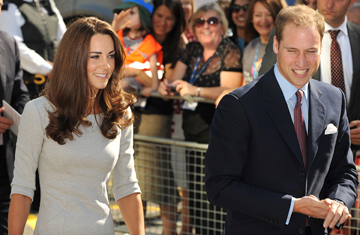
The change to the Act of Succession will affect the children of Prince William and his wife Catherine, the Duchess of Cambridge
When it comes to change, the British monarchy is like an errant lover — it does the minimum required to keep its lady, fair Albion, from booting it out. And so, in an overdue nod to modernity, the rules of royal primogeniture have been altered to allow a first-born female to succeed the throne. This means if Kate and Wills (and any future monarchical couples) produce a daughter first, she will be Queen, no matter how many little brothers toddle along after her.
The leaders of Britain's band of ex-colonies, known as the Commonwealth, approved the change on Friday, along with an amendment to the Act of Succession that allows a future monarch to marry a Roman Catholic. Before now, falling for a Catholic meant giving up your right to the throne. (The amendment doesn't, however, allow the crown to be worn by a Catholic — Protestants only, please.)
The decision upends over 300 years of constitutional tradition beginning with the 1688 Bill of Rights, which declared that it was dangerous to the "welfaire of this protestant kingdome" for a King or Queen to marry "a papist." It may seem like a 17th century version of the red scare. However, against the background of the English civil war, the reign of the Catholic "Bloody Mary," and the Gunpowder Plot — a failed attempt by Catholics to blow up the House of Lords and assassinate King James I in 1605 — such rules may have once been more than just McCarthyism.
By contrast, boys inheriting the crown before girls was not a political decision. It's just the age-old Norman practice of male primogeniture, enshrined in English common law. Members of Parliament have tried to change the succession laws 11 times over the past few years — the latest being an attempt by Labour MP Keith Vaz, who tabled a bill in the House of Commons in January of 2011 that has yet to be passed. He noted that all six of England's Queens have been "fantastic" but that now it's "all about the children of William and Kate Middleton. We have a biological deadline."
The changes (which still have to be ratified by Parliament) were announced at the Commonwealth Heads of Government Meeting in Perth, Australia, where the Queen has been on tour, listening to didgeridoos and sampling kangaroo stew. Her Majesty doesn't have a hand in the decision, but court officials say she strongly supports the change. British Prime Minister David Cameron, meanwhile, heralded the new rule. "The idea that a younger son should become monarch instead of an elder daughter simply because he is a man, or that a future monarch can marry someone of any faith except a Catholic — this way of thinking is at odds with the modern countries that we have become," he said at the meeting.
Some say the change feels like wiping your finger across the top of the corner cabinet — you don't realize how dusty it is until you've touched it. "These are concessions so overdue that already they feel trivial," writes the left-leaning Guardian newspaper in an editorial, which nonetheless welcomed "a zephyr of egalitarian zeal" in court circles.
Others say the idea of an egalitarian monarchy is a contradiction in terms. "It is crass to suggest that any tinkering with the monarchy is an issue of equality — it makes a laughing stock of Britain," said the campaign manager for antimonarchy group Republic, Graham Smith, in a statement Friday. "The monarchy is founded on discrimination and elitism. It has no place in a debate over equality of opportunity."
While the commentariat squabbles over the import — or irrelevance — of the change, historians say the move is part of a royal survival tactic that emerged during the reign of George V after the destruction of the European monarchies in 1917-18. King George (who delivered the first royal radio address in 1932) recognized that the British monarchy might not last unless it evolved, says historian Roger Lockyer, a retired professor of history at Royal Holloway, University of London. "He turned the monarchy into a 'caring' monarchy, into a monarchy that patronized charities. And so the monarchy of remoteness has deliberately been replaced by a monarchy of access." The monarchy of access continued throughout the 20th century — from Queen Elizabeth II's first Christmas television broadcast in 1957 to the opening of Buckingham Palace to the public in 1993 — and lives on today in Duchess Kate's $50 Zara frocks.
While the monarchy modernizes, the English aristocracy has shown no signs of changing its laws of primogeniture that put young lords before ladies. Lockyer says it is typical of the royals to strike out in a different direction from the English peerage. "One of the monarchy's weak sides in the modern world has been its links to the aristocracy — to the old world," he says. With Friday's decision, the royals continue to amend the traditions of title. It's what they must do, it seems, to keep their own.
